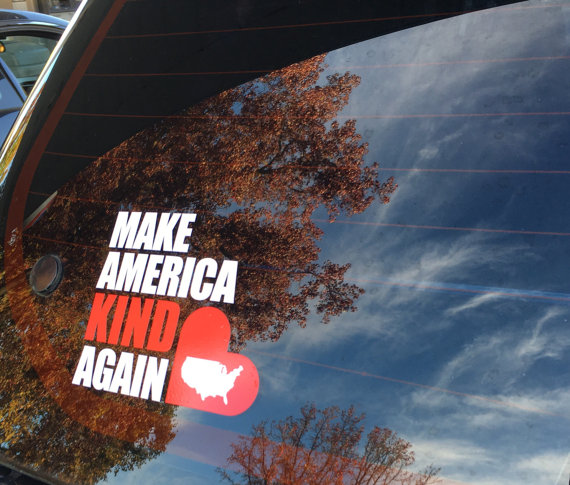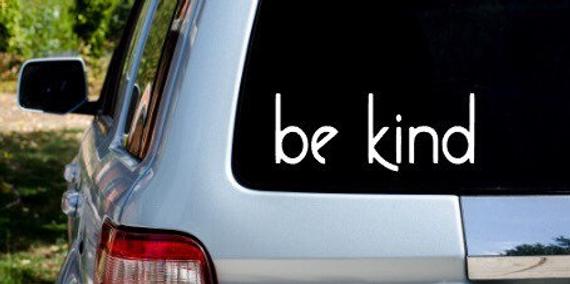Ames, IA. Two or three times over the past few years, I’ve noticed a bumper sticker that says “Be Kind.” Recently I discovered online that you can buy a lot of different stickers with that message, or with variations on the basic sentiment. Mine wasn’t a rare, incidental sighting. A host of our fellow motorists are urging us to be kind, and they aren’t just talking about the way we drive. Kindness, for many, fulfills the urgent need of our time. It’s the cure for what ails us, the thing that everyone should be doing right now. As one sticker declares, “It’s cool to be kind.”
I realize that calling a bumper sticker shallow is like criticizing “Happy Birthday to You” for not being a Bach chorale. But what does it mean when someone uses his or her car to proclaim “In the end, only kindness matters”? According to this statement, being kind isn’t merely an advisable practice like looking both ways or getting regular dental checkups. Kindness is prescribed here as the ultimate measure of the good or moral life. It’s this bumper-sticker belief that I can’t help but question.
“Be kind” is an infantilizing directive, something kindergarten teachers tell unruly five-year-olds. You can insist that that’s the beauty of it, that being kind epitomizes the simplicity of right conduct—but sometimes “simple” amounts to “meager.” Being kind is okay, but what about being noble or good? Kindness feels thin and insubstantial beside, say, the rich catalog of virtues in Aristotle, or the stern reasoning of Kant’s categorical imperative, or Jesus’ invitation to have life abundantly. There are in fact a good many things besides kindness that matter. Will being kind help me use my talents to the fullest? Can kindness help me navigate every ethical dilemma?
The kindness vogue isn’t just simplistic. It’s also a bleakly despairing response to our times. “Make America Kind Again” one bumper sticker pleads, ensuring we get the current urgency of being kind. Here kindness feels like a fall-back position, our best hope when cruelty is rampant and no alternative seems viable. (“Just Be Kind!” “Be Kind Anyway.”) A belief system more rigorous and specific than being kind could exclude someone, after all, and anyway it would be too hard, so we throw up our hands and settle for kindness. One sticker casts our predicament in bald if wordy terms: “We don’t have to agree on anything to be kind to one another.” Amid the ruins of consensus and understanding, kindness will have to do.

Well…is that so bad? As they say about getting old, it beats the alternative. Better to be kind than to cage little children, or to ridicule the weak, or to punch someone at a political rally. Kindness has a long, legitimate standing as praiseworthy conduct. Injunctions to be kind appear throughout the Old and New Testaments. Luther writes of the “godly and kind” ministers through whom God chooses to work (“On the Councils and the Church,” 1539). Anyone who isn’t a sociopath tries to be kind, and desires kindness from others. Just being kind, however, is a more recent standard. And there are reasons to doubt whether just being kind is enough.
When Blanche Dubois said she’d “always depended on the kindness of strangers,” she made it sound like a risky, surprising thing to do. In fact, we almost always practice our everyday “kindness” toward people we hardly know, or don’t know at all. I’m being kind when I hold the door for a mom pushing a stroller, or fetch down a jar of preserves for a little old lady in the grocery store, or drop a dollar in the coffee shop tip jar. If you compliment the writer of an engaging post, what do you hear back? “Thank you for your kind words,” of course. If I give a ride home from a party to a couple I just met, they thank me for my kindness as they get out of the car. I probably won’t be called “kind,” though, if I drive across town to pick up my wife who’s caught in a rainstorm, or if I help one of my children move into a new apartment, or if I water my neighbor’s plants while she’s away on vacation. These people are more to me than objects of kindness. I’m obliged to them by bonds of love and friendship, so I get no pat on the head for being kind.
Being kind is pleasantly anonymous, an effective way to hold people at arm’s length. I’m delighted to be kind to you—but please let’s leave it at that. If after a week or two I see the couple from the party on the street, chances are we’ll pass without recognizing each other. We might even pretend we don’t recognize each other, so preferable is it to confine our relations to kindness.
In the strained atmosphere that produced a bumper crop of “Be Kind” stickers, kindness is the evasive tactic we crave. If I’m just kind to you, I don’t need to find out what you think or reveal what I think. We don’t need to know each other in any meaningful way. We can remain bitter foes, exchanging compliments and smiles, locked silently in our endless cold war. Where does being kind leave off, and cowardice begin?
If it keeps us from flying at each other’s throats, I’ll take kindness every time. But if we seek more than survival, something more like reconciliation and healing—if we hope to rediscover a common endeavor—kindness barely takes the first step. It’s the “Hi, how are ya” of life together. “In the end, only kindness matters.” On the contrary: kindness is just the beginning.






8 comments
Joe P.
A Most lovely, compassionate article Re:kindness. I don’t know about bumper stickers, but what I do know is that I, personally am inspired to make most people I come in contact with feel happy, say something that makes a stranger smile…usually a smile on my face alone will make someone return the smile without having to say a word…just recognizing the fact that everyone is a human being and usually worth something even if it’s just a SMILE.
I must say that there are those times, for whatever the reasons, that I don’t feel like smiling at anyone, but in spite of the way I may be feeling, I just smile anyway and it makes me feel better and allows me to forget my inner feelings of sadness, bitterness, anger, sorrow, etc. So I say, let’s all start on the path of being kind to one another just because it’s a GOOD THING TO BE KIND!
Dominic Garzonio
Thanks David for this insightful piece. I often find myself with the same ambivalent feelings towards the black-and-white “Resist” bumper stickers that I’ve seen pop-up since the 2016 election. I can appreciate the sentiment but am often left with too many questions and no clear direction on where to go. Resist what? Why resist? How should we resist? Who is profiting from this bumper sticker and, perhaps, should they actually be the subject of our resistance?
Mel Livatino
Dear David, Your essay was both brilliant and courageous. And very economical too.
To question kindness is no easy thing. We’ve all been trained to be kind, or, rather, I wish we had all been trained to be kind, but so many of us aren’t, at least we aren’t some of the time, and those moments are the ones where we deeply feel the need for kindness, the other person’s if he or she has been unkind or thoughtless, or our own if it is we who have failed and then minutes or hours or lives later realize to our horror how we have behaved. Now that I think about it, I realize how much I’d rather have someone be unkind to me than come to see my own unkindness to the people I love or have loved, if they are no longer with me. It is those people — the people no longer with me whom I have loved dearly but have been unkind to — and those memories that haunt me as nothing else in my life does. I have drifted from the point I wanted to make: you are right to see that kindness is only the opening of the door to being together in love. Forgive me for drifting and wandering in my thoughts. I will come back to my original thought — that your essay was brilliant and courageous. You made me think about kindness in a way I never have before. Thank you for that, David. Mel
Matt Stewart
Thanks for a fine article. I especially appreciate your concluding statement that “kindness is just the beginning.” Were you to substitute “civility” for “kindness” would you make similar points? Kindness is for progressives what civility is for conservatives?
Kindness and civility are necessary for human flourishing, but not sufficient?
Keith w Petersen
I enjoyed your article. My experience is similar to Robert’s previous comment. Niceness as a road to tolerance. Tolerance is not a virtue. Fath, hope and charity are all virtues.
I see you are in Ames? I’m a ’83 alumni. Go ‘clones.
Robert
I only wish they actually meant it. Kindness is the threshold to love. Of those I know with the bumper sticker, though, what they really mean is be nice. And that, as we know, is the threshold to a dangerous and manipulable sentimentality.
leroy see
Interesting article and discussion of the current state of society which is as I see it generally unkind. As a noun the word kind suggests being with others like ourselves so being kind could very well turn out to be a call to groups together for better or worse because we are all of one nature. On the other hand, and in academia there is always way least one other hand, being kind as an adjective kind suggests actions that are at least civil, and could also be compassionate which adds an element of empathy to an action. Back to the article, though, absent an underlying reason or motivation for being kind what it looks like depends upon the standards of a particular society. To tell the truth, in today’s society be kind no longer has a Judaeo-Christian referent. Instead, being kind means behaving in a way that is deemed politically correct in speech, thought, and action as defined by the powers that be at the time. Taken to the extreme, being kind can come to mean telling people who don’t share a common referent they are indeed unkind, and it is therefore unkind not to offer correction or sanctions. Ouch…
Brian Miller
Point well taken. And bumper stickers are frequently annoying. What is the current phrase… “virtue signaling”? However, I have seen plenty of yard signs and they are all hand painted that say Be Kind! It started as a fundraiser by a small church in Indiana as far back as 2015. Initially is was a grassroots effort. It was picked up by other churches in the Midwest and Upper South, mainly in small towns and out, like where we live, in the country. They offer them at community events.
Overall, I see it as a friendly reminder to be a good neighbor. Although the first one I saw, early in 2016, was planted in a yard underneath a 5×20 foot banner declaring “Trump in 2020”. Not sure if they were signaling the president, their neighbors, or a split domestic scene unfolding behind closed doors.
A hand painted sign boosting your local church and community or someone cashing in as a business with Be Kind keychains, coffee mugs, t-shirts? I know which I’d prefer.
Comments are closed.